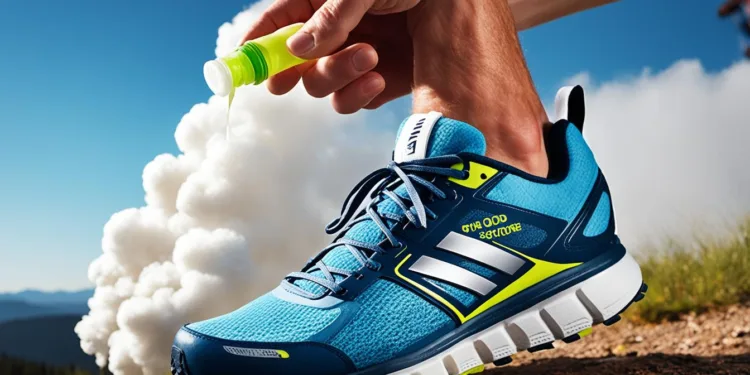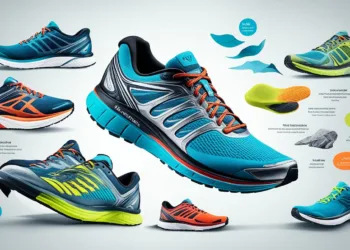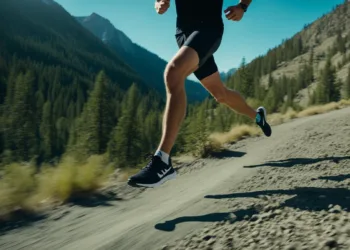Table of Contents
- 1 The Science of Stink: Understanding Running Shoe Odor
- 2 Running Shoes Odor Control: Best Practices for Prevention
- 3 Managing Odor in Running Shoes: From Household Remedies to Commercial Solutions
- 4 Running Shoe Freshness and Odor Control: Tips for Post-Run Care
- 5 How to Control Running Shoe Smell: The Power of Natural Ingredients
- 6 Natural Ingredients for Odor Management: A Comparison
- 7 Running Shoe Odor Elimination Techniques: When It’s Time to Wash
- 8 Effective Running Shoe Odor Management: Advanced Products and Innovations
Running Shoes Odor Control: If you’re a runner, you know the struggle with smelly shoes all too well. Sweat and moisture from your feet can cause unpleasant odours in your running shoes. But don’t worry- there are effective ways to keep running shoes odor-free.
According to Luke Lombardo, an RRCA-certified running coach and Ironman triathlete, the unpleasant smell associated with used running shoes is due to the bacteria bred by trapped moisture. The question then is, how do you control running shoe smell? Some solutions include thorough drying, using odour-reducing sprays and consistent airing out in a well-ventilated space.
These running shoe smell solutions keep your shoes smelling fresh and help mitigate the harmful bacteria that could lead to infections. So, let’s dive in and look at the best practices to keep your beloved running shoes as fresh as the day you bought them.
Key Takeaways:
- Understanding the Science of Shoe Odor
- Best Practices for Odor Prevention
- Household Remedies vs Commercial Solutions
- Post-Run Care for Shoe Freshness
- Natural Ingredients for Odor Control
- Comparing Odor Management Ingredients
- When and How to Wash Shoes
- Advanced Products for Odor Management
The Science of Stink: Understanding Running Shoe Odor

The stinky smell perpetuating from your running shoes is primarily caused by bacteria thriving on the moisture and warmth of your sweat-soaked footwear. This smelly issue is more than just a casual annoyance; it’s a complex biological problem that directly affects the lifespan and freshness of your shoes.
Sweat, by itself, doesn’t smell too bad. It is mainly composed of water but has a bit of salt, proteins, and oils. Things turn sour when the bacteria on your skin start metabolizing the proteins and fats in your sweat, particularly those from the high concentration of sweat glands on your feet. This bacterial feast produces compounds like isovaleric acid, mainly responsible for the foul smell. Foot-specific bacteria like corynebacterium are the predominant culprits here.
This might make bacteria seem like an enemy. However, it’s interesting to note that despite their role in causing odor, bacteria also play positive roles in ecosystems. They are used to decompose waste and serve as natural fertilizers in agriculture, pushing us to respect this dual role. The table below gives us a sneak peek into this fascinating microbial world:
| Bacteria Type | Odor Compound Produced | Positive Role in Ecosystem |
|---|---|---|
| Corynebacterium | Isovaleric Acid | Protein Decomposition |
| Staphylococcus epidermidis | 3-Methyl-2-Hexenoic Acid (Sweaty Smell) | Competes with Disease-Causing Bacteria |
| Pseudomonas aeruginosa | 2-Aminoacetophenone (Grape-like Smell) | Decompositions Organic Matter |
Understanding the cause of the odor is the first step towards managing odor in running shoes. In the next section, we will explore how to tackle this bacterial activity and prevent smell in your running shoes.
“read more: Running Shoes Hoka“
Running Shoes Odor Control: Best Practices for Prevention
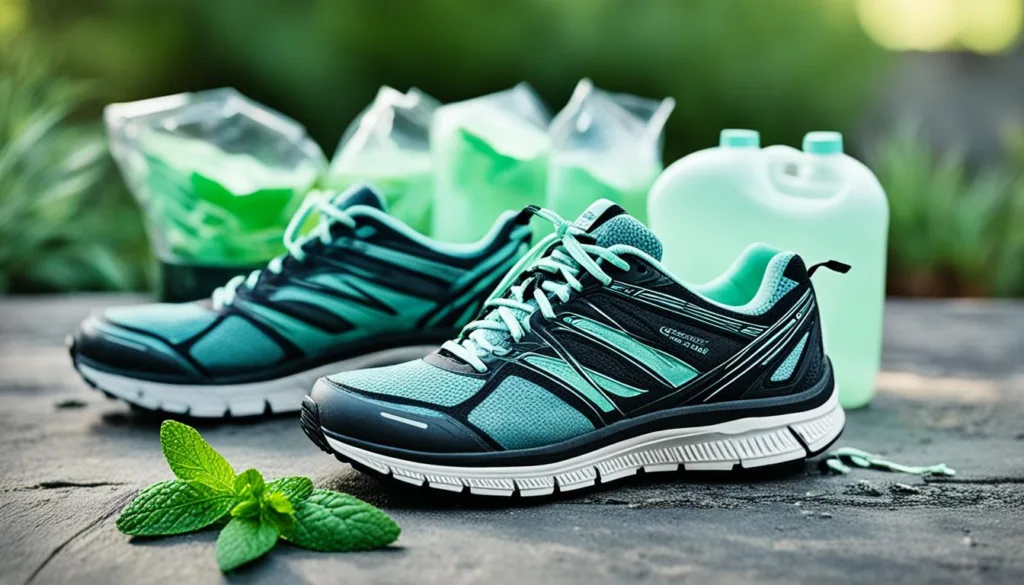
Controlling the odor in running shoes is a multifaceted process. Therefore, implementing practical and effective measures in your daily routine can make a significant difference. Let’s delve into the best practices for prevention, starting from daily foot hygiene.
Why Daily Foot Hygiene Matters
Practicing good foot hygiene is the first step in reducing running shoe odor. Daily cleansing removes bacteria and fungi from your feet, decreasing their chance of transferring to your shoes. Besides, dry feet help create an unfavorable environment for microbial growth, a primary reason behind shoe smells.
The Importance of Wearing the Right Socks
While it might seem insignificant, choosing the right socks plays a substantial role in maintaining running shoe freshness. Moisture-wicking socks are the runners’ favorite for a reason—they absorb sweat from your feet, keeping them dry and less prone to produce odor.
Choosing Breathable Running Shoes for Better Ventilation
Running shoes made from breathable materials are excellent for odor control. Better air circulation allows sweat to evaporate, reducing the moisture inside your shoes, which can otherwise lead to smell development.
Rotating Your Running Shoes to Minimize Odor Buildup
Lastly, rotating your running shoes is a simple yet effective running shoe odor management technique. Utilizing more than one pair of shoes for running gives each pair adequate drying time, preventing the constant build-up of moisture and bacteria that contribute to odor.
By integrating these preventative strategies into your routine, you can wave goodbye to the vexing smells and extend the lifespan of your favorite running shoes. Remember, maintaining shoe hygiene contributes to their longevity and enhances your running experience.
“read more: Running Shoes Saucony“
Managing Odor in Running Shoes: From Household Remedies to Commercial Solutions
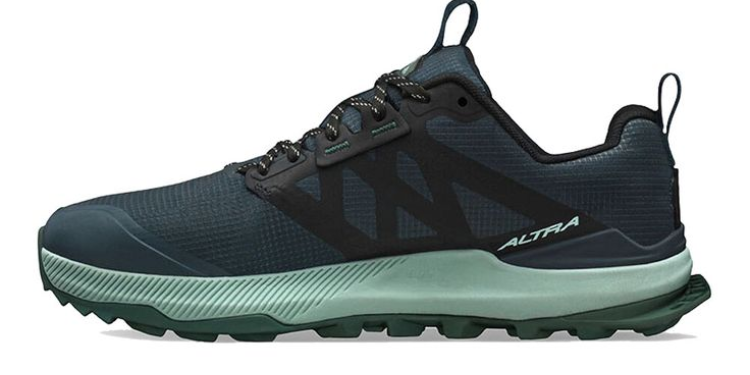
Keeping your running shoes fresh is an important task that often starts at home. Many rely on household remedies such as freezing shoes or baking soda to absorb smells and moisture. These Running Shoe Smell Solutions can be an affordable and accessible first step towards odor control. However, it’s important to note that while these methods may help reduce odour, they might not be entirely effective in killing off odour-causing bacteria.
To further enhance your Running Shoe Odor Elimination Techniques, you might want to consider commercially available products. These include special sprays, powders, and inserts specifically formulated to target and eliminate odor-causing bacteria.
These products offer a quick and efficient solution, providing long-lasting freshness to your running shoes. However, choosing the right product can sometimes feel overwhelming due to the abundance of available options. To help you make an informed decision, we have compiled a simplified comparative table showcasing some standard products and their key characteristics.
| Product Type | Description | Effectiveness |
|---|---|---|
| Odor-Eliminating Spray | A commercial spray formulated to target and kill odor-causing bacteria in shoes, leaving a fresh scent behind. | Effective for limiting bacterial growth, provides quick relief from shoe odors. |
| Odor-Absorbing Powder | A powder is applied directly into the shoe to absorb moisture and neutralize odors. | Long-lasting freshness, great for heavily used running shoes. |
| Deodorizing Inserts | Designed to be placed inside the shoe for prolonged periods, effectively absorbing odors and providing a fresh scent. | Prevents the growth of bacteria, great for constant use. |
The market offers a variety of options, from natural ingredient-based applications to chemically engineered formulas. These options cater to different needs and preferences for Running Shoe Odor Control, allowing you to choose the best solution.
“read more: Running Shoes Altra“
Running Shoe Freshness and Odor Control: Tips for Post-Run Care
Controlling odor and maintaining freshness in your running shoes can seem challenging, but with a few key post-run care techniques, it’s entirely achievable. These strategies target the root causes of shoe smell, notably moisture and bacteria, allowing you to enjoy cleaner, fresher shoes for your running activities.
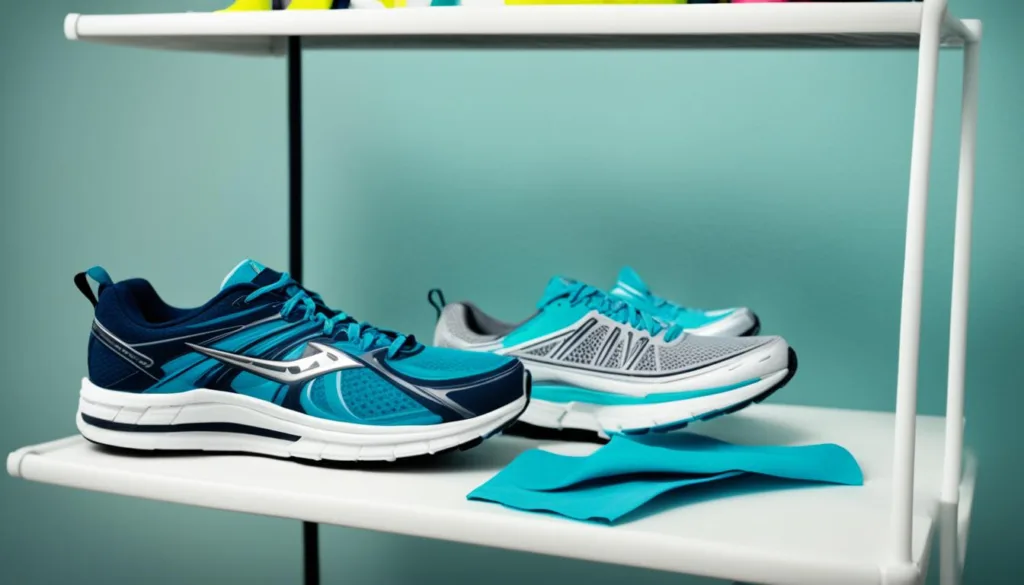
Drying Techniques to Combat Moisture and Bacteria
Eliminating moisture from your running shoes after every run is crucial. Moisture is the prime environment that encourages bacterial growth which leads to shoe smell. Appropriate drying techniques can help control the situation from getting out of hand. One effective method is using newspapers to absorb moisture from the shoes, replacing the newspaper every few hours until the shoes are completely dry. Storing your shoes in a cool, dry and well-ventilated space goes a long way in keeping them fresh.
The Role of Sunlight in Sanitizing Your Running Shoes
Another technique in your arsenal for preventing smell in running shoes is the sun. Sunlight has natural sanitizing properties and aids in drying the shoes. When your shoes are wet or damp after a run, let them air dry in a sunny spot for a few hours. However, too much sunlight may damage the shoe material, so moderation is key here.
The Freezer Hack: Does it Really Work?
Freezing shoes is often suggested as a popular hack for controlling running shoe smell. While it may provide temporary relief from the odor, it does not eliminate the bacteria entirely. Therefore, while it can be a part of your footwear care routine, it should be combined with other effective methods for how to control running shoe smell.
Proper storage of your shoes also plays a part in controlling shoe smell. Always store your shoes in a dry, well ventilated area away from excessive heat or cold. The following table outlines these tips for post-run shoe care.
| Post-Run Care Tips | Description |
|---|---|
| Drying Techniques | Use newspapers to absorb moisture, replace every few hours until shoes are entirely dry. Store in a cool, dry, well-ventilated space. |
| Sunlight | Sunlight has natural sanitizing properties and aids in drying shoes. Avoid excessive exposure to prevent damage to shoe materials. |
| Freezer Hack | Freezing shoes can temporarily reduce shoe odor but doesn’t completely eliminate bacteria. Use in combination with other methods. |
| Proper Storage | Store shoes in dry, well ventilated area away from excessive heat or cold. |
“read also: Running Shoes Reebok“
How to Control Running Shoe Smell: The Power of Natural Ingredients
Tackling the persistent issue of running shoe odor doesn’t have to involve a litany of unfamiliar chemical products. Nature itself provides a trove of effective Running Shoe Smell Solutions that are not only potent but also eco-friendly. Let’s explore how some commonly available natural items can assist in your journey towards complete Running Shoe Odor Management.

Baking Soda: A Natural Odor Absorber
A frequent household ingredient, baking soda, is renowned for neutralizing unpleasing odors. The science behind this is that baking soda’s alkaline nature helps counteract the acidic isovaleric acid, the usual culprit behind shoe stench. This Natural Running Shoe Smell Solution is simple to utilize: just sprinkle some baking soda inside your shoes and let it absorb the smell.
Activated Charcoal: The Heavy-Duty Deodorizer
Activated Charcoal is known for its high absorbency, making it a powerful deodorizer. It draws in the foul-smelling molecules, effectively trapping them in its porous structure. You can conveniently use it by filling up small cloth bags with activated charcoal and placing them in your running shoes overnight.
Vinegar and Other Natural Sprays: Temporary Relief or Permanent Solution?
Many running enthusiasts have touted the antimicrobial properties of vinegar. While it can potentially bring temporary relief, it might not be the permanent Running Shoe Smell Solution you’re seeking. Frequent usage could even potentially harm your running shoe materials. Remember to dilute it in water before spraying inside your shoes to prevent any adverse effects.
Natural Ingredients for Odor Management: A Comparison
| Natural Ingredient | Mode of Action | Usage Tips |
|---|---|---|
| Baking Soda | Neutralizes isovaleric acid | Sprinkle inside shoes |
| Activated Charcoal | Absorbs bad odor | Fill in small cloth bags and place inside shoes |
| Vinegar Spray | Antimicrobial properties | Dilute and spray inside shoes |
Using natural ingredients can therefore be an easy, cost-effective, and eco-friendly way to manage running shoe smell. They provide a refreshing alternative for individuals who may be sensitive to artificial scents or alarmed by the use of strong chemicals. However, their effectiveness might vary based on the severity and cause of the shoe odor, yet they definitely have a role in running shoe odor management strategies.
Running Shoe Odor Elimination Techniques: When It’s Time to Wash
The concept of Running Shoe Freshness and Odor Control extends beyond airing and quick fixes. An integral, yet often overlooked step in achieving this is washing your running shoes. It might come as a surprise but each shoe brand provides specific guidelines for washing their shoes, some suggest hand-washing while others permit occasional machine washing.
This doesn’t mean you need to toss your shoes in the washer after every run, but periodic and proper cleaning can lead to an improved lifespan and freshness of your shoes. Particularly, it prevents issues such as athlete’s foot, which is considerably more common among regular runners due to the constant exposure to moisture and bacteria.
However, it’s important to remember that while Tips for Reducing Running Shoe Odor include various fixes and tricks, they may not always tackle the bacterial and fungal build-up that leads to the unsettling smell. That’s where washing plays a major role in comprehensive Running Shoe Odor Control.
- Follow the washing instructions provided by the manufacturer to ensure you do not damage your shoes. Some materials may not respond well to machine washing or certain detergents.
- Avoid fully immersing your shoes in water. Instead, use a brush to scrub off the dirt and then wash them with water.
- Always air-dry your shoes after washing. Never place them in the dryer or expose them to direct heat as it could warp the shoes’ shape and damage their materials.
Develop and adhere to a regular cleaning routine that fits your running schedule. Whether weekly, bi-weekly, or monthly, what’s important is that you’re proactively preventing odor, not just reacting to it. This way, you maximize not just the lifespan of your running shoes but also the joy of your running experience without the unwelcome interruption of persistent odours.
Effective Running Shoe Odor Management: Advanced Products and Innovations
Keeping up with innovations in running shoe odor control is essential to maintaining fresh and clean footwear. Modern advancements offer options to outwit the stubborn stench that can linger in well-used running shoes. Whether you are looking for a proactive approach or need help with overwhelming odors, these advancements in odor elimination techniques present promising solutions.
Probiotic Deodorants: The Future of Odor Control?
Probiotic deodorants take a biological approach to running shoe odor control by promoting beneficial bacteria to edge out the odor-causing counterparts. These products introduce good bacteria that gobble up resources, making it harder for bad bacteria to survive and produce unpleasant smells. This fascinating biological strategy could potentially change how we deal with shoe odor.
Odor-Fighting Insoles and Inserts: Do They Work?
Modern industries have produced specialized insoles and inserts equipped with technology to combat odor. Using materials that either absorb the smell or are embedded with antimicrobial agents to kill the bacteria, these products provide an easy solution to keep your shoes fresher for longer. The answer is yes; these insoles and inserts work and add an extra layer of defence against foot odour.
The Best Odor-Controlling Sprays and Powders on the Market
In the pursuit of preventing smell in running shoes, numerous odor-controlling sprays and powders have entered the market. These products, loaded with natural ingredients or chemically engineered formulas, are rigorously tested for effectiveness. They can be sprayed or sprinkled in shoes after your runs, directly tackling potent odors and offering a refreshed feel whenever you step into your shoes.
In conclusion, managing the odor of running shoes is a multifaceted process that involves understanding the science of the odor, implementing best practices for prevention, and using both household remedies and commercial solutions. Post-run care is crucial to maintain the freshness of the shoes. The power of natural ingredients can be harnessed to control the smell, and when it’s time to wash, there are specific odor elimination techniques to follow. Advanced products and innovations also play a significant role in effective odor management.
Running Shoe Odor Control can be challenging, but you can keep your shoes smelling fresh with the right tips and advice. First, understand that the smell is caused by bacteria that thrive inside the shoes’ damp and warm environment. Sweat doesn’t smell, but it creates a perfect environment for bacteria. Start by keeping your feet clean and dry to eliminate the smell. Wash your feet thoroughly every day, and always wear clean socks.


